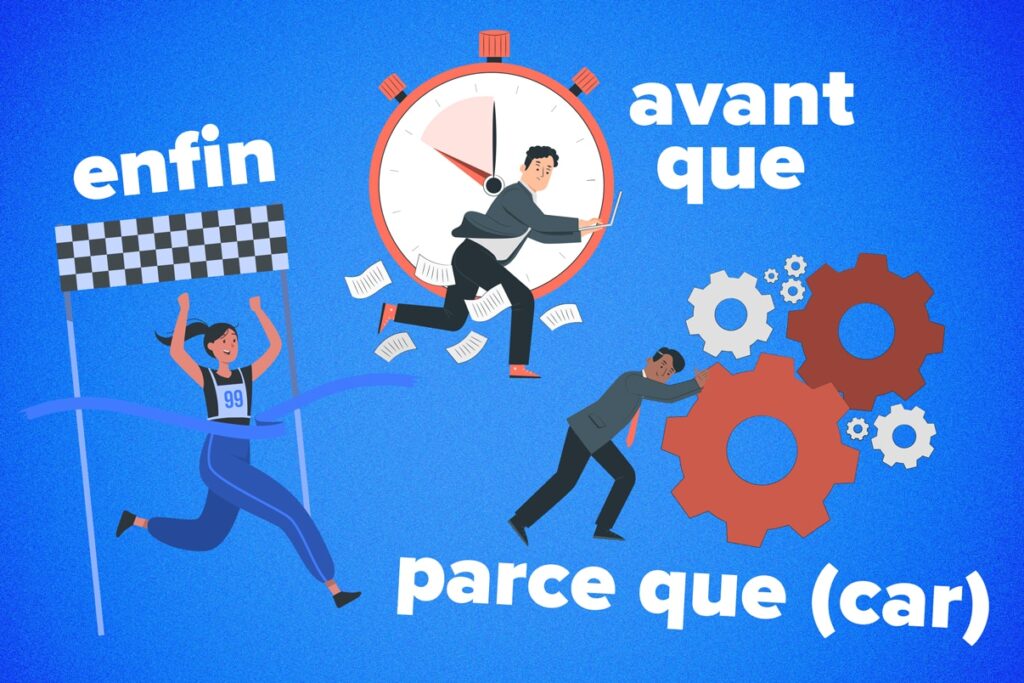Contents
- 1. D’abord
- 2. Ensuite
- 3. Puis
- 4. Enfin
- 5. Ainsi que
- 6. Après que
- 7. Avant que
- 8. Bien que
- 9. Dès que
- 10. Parce que/car
- 11. Pour que
- 12. Quoi que
- 13. Tant que
- 14. Comme / puisque
- 15. Lorsque / quand
- 16. Quoique
- 17. Donc
- 18. En fait
- 19. Cependant
- 20. En revanche / par contre
- 21. En plus / en outre
- 22. Pour ma part / pour moi
- 23. À mon avis
- How to Integrate French Transition Words into Your Diet
- And One More Thing...
23 Key French Transition Words for Seamless Conversation

The French language has quite the catalog of transition words to help hold it all together. Not only do they keep you from sounding robotic, but they’re also the key to writing effective essays, understanding the literature you’re reading and improving your comprehension and conversation.
Here are 23 French transition words that you can start integrating into your sentences.
Download: This blog post is available as a convenient and portable PDF that you can take anywhere. Click here to get a copy. (Download)
1. D’abord
Translation: First of all
Subjunctive-friendly? Nah.
When you think “transition word,” this may be what you’re thinking. To start with the basics, here’s one of the first transition words you likely learned in French class. It’s best at the beginning of sentences, when giving directions or when recounting a series of events.
D’abord, il faut réchauffer le four. (First of all, you must preheat the oven.)
2. Ensuite
Translation: Next
Subjunctive-friendly? Nuh-uh.
An easy way to remember this one (yet another in the series of your basic transition words), is that la suite is the sequel or “the next one” in French. It’s a useful piece of vocab when delving into French book series and films, and this transition word is obviously useful for continuing a series of events or directions you may be giving.
Ensuite, je prépare la tarte aux cerises. (Next, I prepare the cherry pie.)
3. Puis
Translation: Then
Subjunctive-friendly? Not this one, either.
Then, you’ve got puis. If you’re unfamiliar with this one, just know that it’ll come up a lot in literature and conversation. It’s a very useful transition word to have under your belt. Puis proves to be a good fallback word to have when some of the more specific transition words slip your mind.
Puis, je coupe les pêches. (Then, I cut the peaches.)
4. Enfin
Translation: Finally
Subjunctive-friendly? Pas du tout (not at all).
In our d’abord, ensuite, puis sequence, we end with enfin. This useful word is not only used as a transition to mark la fin (the end) of something, but is also an interjection—a filler word, if you will.
It can mean “well,” “all in all,” “I mean” or “at least.” It’s a multi-edged sword. Use it as a transition to an end or to make your conversational French more authentic.
Enfin, on mange tout. (Finally, we eat everything.)
5. Ainsi que
Translation: As well as
Subjunctive-friendly? Nope!
Getting into some more advanced vocabulary now, this means “just as.” This conjunction is useful when elaborating on something you’re already discussing. It can also be used with a different meaning of “just as,” as in “It went just as I thought.”
Je voudrais une tarte aux pommes ainsi que deux boules de glace. (I would like apple pie as well as two scoops of ice cream.)
6. Après que
Translation: After/when
Subjunctive-friendly? Technically, no, but French speakers tend to use the subjunctive after it regardless. So go ahead and get the extra practice.
Bet you’re wondering what the difference is between après que and that old favorite après. Après is a preposition, and après que is a compound conjunction. All that means is you use the latter when it’s followed by a verb (like in the example). If you wanted to start a sentence with “after,” then you would use the preposition:
Après, on va partir. (After, we’re going to leave.)
Remember that the que helps link the clauses, and you should be good to link the night away.
Je vais dormir après que je mange toute cette tarte. (I’m going to sleep after I eat all this pie.)
7. Avant que
Translation: Before
Subjunctive-friendly? Yes, and don’t you forget it!
Similar to après que, this conjunction is not to be confused with its definition without que. The same distinction can be made—avant being the preposition in this case and avant que the compound conjunction.
Je vais finir la tarte avant que je nettoie la cuisine. (I’m going to finish the pie before I clean the kitchen.)
8. Bien que
Translation: Although/even though
Subjunctive-friendly? Oh, most definitely.
Careful not translate this one to “good that.” This conjunctive phrase is great for showing contrast and adding “conditions” to things, even though you have to know your subjunctive to use it.
Il m’a donné une tarte aux pêches bien que j’aie commandé une tarte aux pommes! (He gave me peach pie even though I ordered an apple pie!)
9. Dès que
Translation: As soon as
Subjunctive-friendly? Never, ever.
This is usually followed by not the subjunctive, but by a future tense! Makes sense considering the context. This is a great conjunctive phrase to use when making threats, lofty goals and uncertain plans. Très useful.
Dès que la tarte arrive, je vais la détruire. (As soon as the pie arrives, I will destroy it.)
10. Parce que/car
Translation: Because
Subjunctive-friendly? No.
You’re likely familiar with parce que, and maybe less so with car. There are some slight distinctions to keep in mind for you nit-picky French speakers out there: Car leans slightly more towards “since” or “for.”
Parce que is a little stronger when used in speech. They both mean essentially the same thing, but it’s good to know both of them to add variety to your French conversation.
J’aime les tartes plus que les gâteaux parce que (car) la croûte est magnifique. (I like pies more than cakes because the crust is magnificent.)
11. Pour que
Translation: So that
Subjunctive-friendly? You better believe it!
Oh, isn’t it great when such a useful conjunction takes the subjunctive? Well, sure it is! That’s how you get practice. Pour means for, but for translation purposes, “so that” makes more sense when using this phrase.
Je fais une tarte pour que tu aies quelque chose à manger ce soir. (I’m making a pie so that you have something to eat tonight.)
12. Quoi que
Translation: No matter what
Subjunctive-friendly? Yes…yet again!
I bet your mind is reeling with how much better your French will sound once you get this one down. No matter what the medium is, it’s useful.
But you may be noticing an interesting trend: A word that you’re well-versed in (bien, quoi, pour), when added to our favorite little word que, can bring out a completely different definition. Keep this in your mental notebook when you read these phrases or hear them spoken!
Quoi que ma mère fasse en cuisine, c’est délicieux. (No matter what my mom makes in the kitchen, it’s delicious.)
13. Tant que
Translation: As long as
Subjunctive-friendly? No, you’re safe on this one.
What’s tant mean anyway? Funny you should ask, because this here is yet another example of fun words being transformed by their trusty sidekick que. Tant by itself means “so much or many,” or can be used to express an indefinite quantity.
If you apply that definition back to this transitional phrase, then you can see something of a rough translation that matches “as long as.” But as long as you remember the definition, you’ll be good to go.
Tant que cette tarte est là, je serai tenté de la manger. (As long as this pie is here, I will be tempted to eat it.)
14. Comme
/ puisque
Translation: Since
Subjunctive-friendly? No and no.
Even though the definition is the same on these two, there is a slight distinction. Comme is useful for showing both the cause and result in a sentence, whereas puisque just gives an explanation.
Comme also likes to hang around at the beginning of sentences, whereas puisque can go in the middle if it so pleases. This distinction will help you sound extra-super pro!
Comme j’ai mangé trop de tarte, je ne peux pas manger mes légumes. (Since I ate too much of the pie, I can’t eat my vegetables.)
Puisque je l’ai fait, je goûte en premier. (Since I made it, I’ll taste [it] first.)
15. Lorsque
/ quand
Translation: When
Subjunctive-friendly? Sadly, no.
These are interchangeable when talking about time, though lorsque is a formal upgrade of quand. Gauge the situation when you pick. They both have their own special purpose as well: Quand can mean “whenever,” and lorsque can mean “whereas.”
Je cuisinais quand/lorsque tu es arrivé. (I was cooking when you arrived.)
16. Quoique
Translation: Even though
Subjunctive-friendly? You better believe it.
Okay, I’ll admit…it does get a bit confusing here. We just did quoi que, meaning “no matter what,” and now we’ve got the same thing minus the space in between and all of a sudden it means “even though”?
These sound the same when spoken, but you should be able to figure it out based on the context. In addition, bien que and quoique can be used interchangeably. Just another opportunity for you to diversify.
Je mangerai une autre tranche quoique je n’aie pas faim. (I will eat another slice even though I’m not hungry.)
17. Donc
Translation: So
Subjunctive-friendly? Not even close.
There is so much to say about this little word. Donc is one of the holy grails of French filler words, one of the little idiosyncrasies of French speech that you’ll pick up while in France and carry with you, smiling, forever.
They use it both in the “correct” fashion, showing causation, as well as how we use it in English: “So, here’s the thing.” “So, I was heading to the store.” “So… So… So…” Remember donc. Cherish it. Can you tell this is my favorite French transition word?
Je veux que tu la goûtes, donc je garde une part. (I want for you to taste it, so I’m saving a piece.)
18. En fait
Translation: In fact
Subjunctive-friendly? No.
You have no excuses for not remembering this one. It’s spelt and sounds similar to the English definition. Use this phrase before emphasizing an important conclusion or key point.
En fait, l’année dernière j’ai gagné une competition. (In fact, last year I won a competition.)
19. Cependant
Translation: However, nonetheless
Subjunctive-friendly? No! No!
Cependant is actually an adverb, but it still functions as a transition word. Use it at the beginning of a sentence to point out an opposition or contradiction. Pourtant is a close cousin, but it’s a little more nuanced, as it indicates that one thing happened when another one was expected to.
Cependant, j’aime un bon gâteau de temps en temps. (However, I enjoy a nice cake from time to time.)
20. En revanche
/ par contre
Translation: On the other hand, in opposition
Subjunctive-friendly? Mais non !
The definition is close to cependant, but provides a little clearer contrast. Those make for two great transition words when you’re writing essays in French or can’t decide which type of pie is better.
Une tarte aux pommes est classique. Par contre, une tarte aux tomates est bonne pour le petit-déjeuner, le déjeuner et le dîner. (An apple pie is classic. On the other hand, a tomato pie is good for breakfast, lunch and dinner.)
21. En plus
/ en outre
Translation: Also
Subjunctive-friendly? Jamais (never).
Need to add something that you forgot before? These two are good ways to vary your language and avoid using aussi (also) at every turn. En plus is common in conversation, and it, as well as en outre, is often a better alternative to aussi in written French.
En outre, il faut choisir un bon parfum de glace pour accompagner la tarte. (Also, one must choose a good ice cream flavor to go with the pie.)
22. Pour ma part
/ pour moi
Translation: For me
Subjunctive-friendly? Stop asking. It’s another “no.”
Here are two phrases to use when you want to put emphasis on “me! me! me!” Pour moi is a good way to order at a restaurant, and pour ma part is best for stating opinions.
Pour moi/ma part, je préfère la tarte au citron. (For me, I prefer lemon pie.)
23. À mon avis
Translation: In my opinion
Subjunctive-friendly? This is the last time I’m saying it…nope.
But when you really want to make it all about you and your opinions, this is the best phrase. To qualify a statement as an opinion, or before you go on a rant about something you’re passionate about, this is a great transitional phrase to use and abuse!
À mon avis, tous ces phrases sont ridicules! (In my opinion, all of these sentences are ridiculous!)
How to Integrate French Transition Words into Your Diet
Get your feet wet with quizzes
Gauging your knowledge with a few quizzes before you delve into any topic is always a good idea. You may even get a little confidence boost when you realize that you already know a sizable handful of transition words!
- Check out this quiz from Quizlet.
- This one makes noise when you click on words.
- And for a challenge, this fill-in-the-blank quiz is the ticket.
Extract transition words from real French materials
Authentic French movies, TV shows and videos are another great place to look and listen for transition words. You’ll hear how they’re used naturally by real French speakers, which is invaluable to incorporating them into your own French.
For a little extra learning support, you could try FluentU.
FluentU takes authentic videos—like music videos, movie trailers, news and inspiring talks—and turns them into personalized language learning lessons.
You can try FluentU for free for 2 weeks. Check out the website or download the iOS app or Android app.
P.S. Click here to take advantage of our current sale! (Expires at the end of this month.)
Write your own beautiful sentences
Practice makes perfect, so get out your pens and paper, and start on those French sentences! Try writing a paragraph that uses four or five transition words.
If you’re more into immersion-based learning, make sure to include appropriate transition words when writing emails to your pen pals, writing entries in your French journal or even in text messages with another French-speaking friend.
Use transition words with the subjunctive
The subjunctive is nothing to fear, but sometimes it can be difficult to integrate into the French you actually use.
If you’re still a beginner, no worries here. Many of the above words and phrases don’t require the subjunctive mood. On the other hand, you always could take the opportunity to learn about this ultra-useful and fun French staple.
Listen to French instructors online
Listening to French teachers and instructors helps boost your knowledge of French connectors and ensures you correctly learn them. For a great introduction to French transition words, check out the FluentU French YouTube video below.
French instructor Kritika takes you through some common transition vocabulary and even tests your knowledge at the end with a fun fill-in-the-blank activity!
Enfin, you’re well-equipped to speak like a pro, write like an essayist and understand all the details in the French literature you’re devouring.
While there are far more transition words than those listed, knowing the basics will do wonders for your fluency.
Choppy French no more!
Download: This blog post is available as a convenient and portable PDF that you can take anywhere. Click here to get a copy. (Download)
And One More Thing...
If you like learning French at your own pace and from the comfort of your device, I have to tell you about FluentU.
FluentU makes it easier (and way more fun) to learn French by making real content like movies and series accessible to learners. You can check out FluentU's curated video library, or bring our learning tools directly to Netflix or YouTube with the FluentU Chrome extension.
One of the features I find most helpful is the interactive captions—you can tap on any word to see its meaning, an image, pronunciation, and other examples from different contexts. It’s a great way to pick up French vocab without having to pause and look things up separately.
FluentU also helps reinforce what you’ve learned with personalized quizzes. You can swipe through extra examples and complete engaging exercises that adapt to your progress. You'll get extra practice with the words you find more challenging and even be reminded you when it’s time to review!
You can use FluentU on your computer, tablet, or phone with our app for Apple or Android devices. Click here to take advantage of our current sale! (Expires at the end of this month.)











